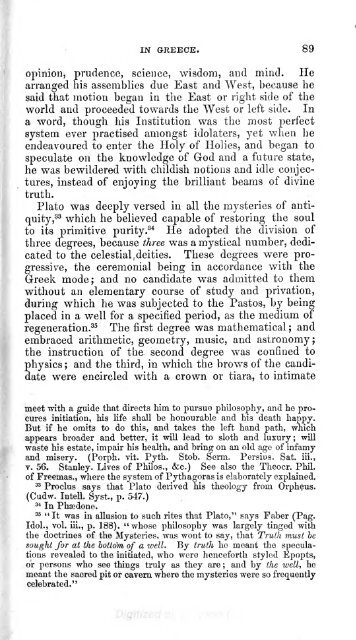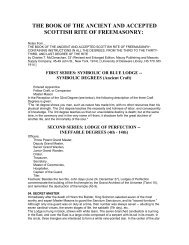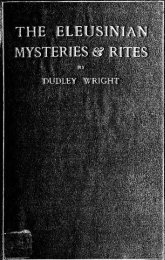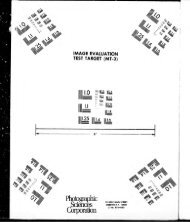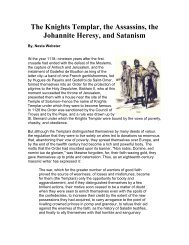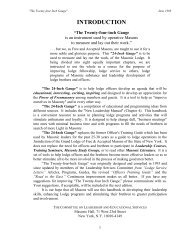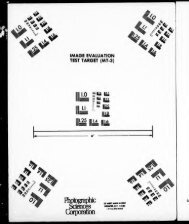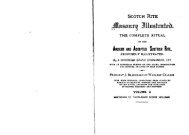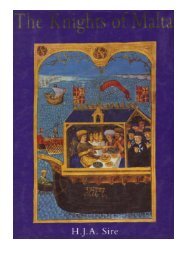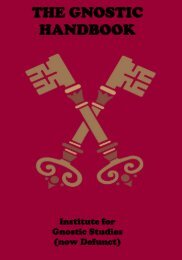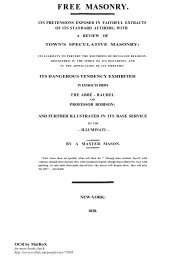The History of Initiation - The Masonic Trowel
The History of Initiation - The Masonic Trowel
The History of Initiation - The Masonic Trowel
Create successful ePaper yourself
Turn your PDF publications into a flip-book with our unique Google optimized e-Paper software.
IN GREECE. 89<br />
opinion, prudence, science, wisdom, and mind. He<br />
arranged his assemblies due East and West, because he<br />
said that motion began in the East or right<br />
side <strong>of</strong> the<br />
world and proceeded towards the West or left side. In<br />
a word, though his Institution was the most perfect<br />
system ever practised amongst idolaters, yet when he<br />
endeavoured to enter the Holy <strong>of</strong> Holies, and began to<br />
speculate on the knowledge <strong>of</strong> God and a future state,<br />
he was bewildered with childish notions and idle conjectures,<br />
instead <strong>of</strong> enjoying the brilliant beams <strong>of</strong> divine<br />
truth.<br />
Plato was deeply versed in all the mysteries <strong>of</strong> anti-<br />
quity, 33 which he believed capable <strong>of</strong> restoring the soul<br />
to its primitive purity. 34 He adopted the division <strong>of</strong><br />
three degrees, because three was a mystical number, dedi-<br />
cated to the celestial deities. <strong>The</strong>se degrees were progressive,<br />
the ceremonial being in accordance with the<br />
Greek mode; and no candidate was admitted to them<br />
without an elementary course <strong>of</strong> study and privation,<br />
during which he was subjected to the Pastes, by being<br />
placed in a well for a specified period,<br />
as the medium <strong>of</strong><br />
regeneration. 35 <strong>The</strong> first degree was mathematical ; and<br />
embraced arithmetic, geometry, music, and astronomy;<br />
the instruction <strong>of</strong> the second degree was confined to<br />
physics ; and the third, in which the brows <strong>of</strong> the candidate<br />
were encircled with a crown or tiara, to intimate<br />
meet with a guide that directs him to pursue philosophy, and he procures<br />
initiation, his life shall be honourable and his death happy.<br />
But if he omits to do this, and takes the left hand path, which<br />
appears broader and better, it will lead to sloth and luxury; will<br />
waste his estate, impair his health, and bring on an old age <strong>of</strong> infamy<br />
and misery. (Porph. vit. Pyth. Stob. Serai. Persius. Sat. iii.,<br />
v. 56. Stanley. Lives <strong>of</strong> Philos., &c.) See also the <strong>The</strong>ocr. Phil,<br />
<strong>of</strong> Freemas., where the system <strong>of</strong> Pythagoras is elaborately explained.<br />
33 Proems says that Plato derived his theology from Orpheus.<br />
(Cudw. Intell. Syst., p. 547.)<br />
M In Phaedone.<br />
35 " It was in allusion to such rites that Plato," says Faber (Pag.<br />
Idol., vol. iii., p. 188), "whose philosophy was largely tinged with<br />
the doctrines <strong>of</strong> the Mysteries, was wont to say, that Truth must be<br />
sought for at the bottom <strong>of</strong> a well. By truth he meant the speculations<br />
revealed to the initiated, who were henceforth styled Epopts,<br />
or persons who see things truly as they are ; and by the well, he<br />
meant the sacred pit or cavern where the mysteries were so frequently<br />
celebrated."


